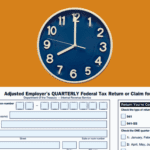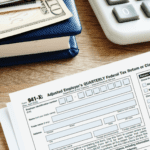Filing your taxes correctly and on time is one of the most important things you can do every year to protect your financial situation. This is because, on top of whatever money you might owe the government, you may also incur hundreds or even thousands of dollars in fees and penalties if you are not careful.
Tax penalties are well-enforced and can add up if not properly dealt with in a timely manner. If you are in a bad place with the IRS, settling your case should be a top priority to avoid racking up additional costs.
Most Common Tax Penalties
While these are not all the tax penalties you may accrue, there are several tax penalties that you can easily find yourself on the receiving end of. These penalties can range from a few hundred dollars to several thousand.
Failure to File Penalty
Failure to file is, perhaps, one of the most common tax penalties. This is the fee that you must pay if you are late filing your taxes or if you forget to file at all.
This year, for example, taxes are due by April 18, 2023. If you think that you might miss that deadline you can be granted an extension upon request. This gives you until October to file. Extensions are common and can help buy you months of time if you are struggling with getting all of your records together.
If you are unable to file in time, you risk a fine of up to 25% of taxes due on top of paying your debt to the IRS. The late filing penalty starts at 5% and increases over time until it maxes out at 25%. This means that filers who receive a return have more leeway with their deadline but individuals who owe the IRS money at the end of the year can end up paying a substantial amount of money. For example, if you owe the IRS just $1000 and you do not file your taxes on time you could end up owing $1250 by the time your penalty maxes out, and that’s just with the taxes and the late penalty. Often the IRS stacks multiple penalties for non-compliance.
Failure to Pay Penalty
While you can request an extension of time to file, you cannot get an extension to pay. The late payment penalty is imposed if a taxpayer pays their taxes after the due date. While it is always best to pay your taxes on time, we know that life gets in the way sometimes. Unfortunately, there is a penalty for late payments even if you are able to pay what you owe in full and are only a few days or weeks, you will likely still have to pay a penalty.
The penalty starts at 0.5% of the unpaid taxes for each month or part of a month that the payment is late, up to a maximum of 25% so the sooner you are able to pay your outstanding balance, the less you will have to pay on top of everything else.
Even if you are not able to pay your fine in full at the time, you can request a payment plan or a delay. This is where legal representation can come in handy. Having a tax attorney on your side can help with difficult communication and ensure that you are not accruing additional fines while waiting for a response from the IRS regarding your case.
Accuracy-Related Penalty
This penalty is imposed if there is a substantial understatement of income. You may also receive an accuracy-related penalty if you claim deductions or credits on a tax return that you do not actually qualify for. This is often not purposeful and is easy to fall into if you are filing without consulting a tax professional. Claiming things like home offices or business expenses is more technical than many people realize, and they might think they qualify for much more than they actually do.
The accuracy-related penalty is typically 20% of the portion of the underpayment of tax that is attributable to negligence or disregard of rules and regulations, while the fraud penalty is typically 75% of the portion of the underpayment of tax due to fraud.
Underpayment Penalty
The underpayment penalty with the IRS is assessed when you do not pay enough taxes throughout the year, either through withholding or estimated tax payments. The penalty is calculated based on the difference between the amount of tax you should have paid during the year and the amount you actually paid. The penalty is calculated based on the federal short-term rate plus 3 percentage points, and the penalty is applied for each day the underpayment remains unpaid.
It’s important to note that if you owe a large amount of tax and do not make estimated tax payments throughout the year, you may be subject to an underpayment penalty. To avoid this penalty, you should make estimated tax payments throughout the year to ensure that you have paid enough tax by the end of the year.
Negligence Penalty
The negligence penalty with the IRS is assessed if you make a mistake on your tax return due to negligence or purposeful disregard of tax law. Negligence is considered any action that can be considered a failure to exercise ordinary and reasonable care in preparing your tax return, such as failing to report all of your income or claiming deductions or credits you are not entitled to.
The negligence penalty is typically 20% of the portion of the underpayment of tax that is attributable to negligence. The penalty is added to any other tax penalties and interest charges that may apply to other penalties such as late payment
It’s important to note that the IRS will not enforce the negligence penalty if you can show that you had a reasonable basis for your tax position, even if the position is ultimately incorrect. You may be able to avoid the negligence penalty by keeping good records, reviewing your tax return for accuracy before filing, and consulting a tax professional with any questions or concerns.
How Do They Calculate How Much You Owe?
The IRS determines what fines and penalties a taxpayer owes based on the specific tax law that applies to their situation. The number of fines and penalties you may owe depends on a variety of factors, including the type and severity of noncompliance, the amount of taxes owed, and compliance history.
The IRS uses a variety of methods to determine what fines a person or business owes, including reviewing tax returns and supporting documents, conducting audits or examinations, and analyzing financial records and other relevant information.
In general, the IRS will calculate the fines and penalties owed based on the tax law applicable to the situation and will provide a notice or bill stating the amount owed. You will have an opportunity to dispute the amount owed through the IRS’s administrative appeals process or by taking legal action in court.
How Can You Avoid Paying These Penalties?
The most effective and obvious way to avoid IRS penalties is to stay tax compliant. Unfortunately, we know that it is not always that simple. Taking steps to consciously file your taxes on time, reviewing your entries before you submit your tax return for validation, and paying any taxes owed before the due date is just one way to take back control of your tax season.
Mistakes happen, of course, and you can even find yourself randomly selected for a tax audit, but keeping the basics in mind can help you avoid a ton of trouble in the future.
If you have already received your official letter from the IRS stating that you are being investigated or owe a fee for late filing or payment, the best thing you can do for yourself is to contact a tax attorney to help you navigate the process.
The Law Office of Steven Klitzner
Tax questions can feel overwhelming and confusing, but they do not have to end with you clearing out your bank account. Qualified and experienced tax resolution attorneys can help get you out of trouble with the IRS and back on the path to being fully tax compliant.
If you have any questions or concerns about tax fines and penalties, call the Law Office of Steven Klitzner at (786) 977-2924 today!







 Steven N. Klitzner, P.A. is a tax attorney based in Miami, Florida. He has been practicing tax law for over 40 years, and currently holds a 10.0 rating by Avvo. Mr. Klitzner was appointed to the IRS Service Advisory Council in 2021 and is...
Steven N. Klitzner, P.A. is a tax attorney based in Miami, Florida. He has been practicing tax law for over 40 years, and currently holds a 10.0 rating by Avvo. Mr. Klitzner was appointed to the IRS Service Advisory Council in 2021 and is... 





